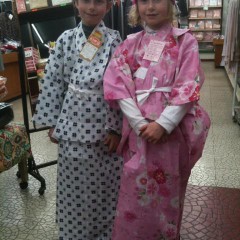オーストラリアから来たMcKeanの双子(5歳)が旅館の浴衣を着たら、凄く気に入って、買いたいと言い出しました。亀清旅館の前に衣料品屋さんのべに屋に連れて行きました。
日本人にはコスプレが流行っているけど、それに似ているかどうかわかりませんが、我々欧米人は「和服」にあこがれています。私だって、毎日に和服の作務衣を着ています。(毎日がコスプレかな?)
とにかく、オーストラリアからのMcKeanさん達をべに屋さんに連れて行ったら、浴衣の色やスタイルを見たり、来てみたりして、盛り上がりました。お店の斉藤さん達も海外の方との交流を楽しみながら手伝いました。皆さんで良い思い出が出来ました。
最近、観光の業界で「インバウンド」との事で騒いでいます。大半の目的は「売り上げが減っているから外国の観光客からお金を落としてもらう」のように見えるけど、私にとっては「インバウンド」の目的はまさにこういう場面:オーストラリアからの5歳の双子が浴衣を着る笑顔+お店の皆様の扱っている和服で海外の方との交流の喜び。
The McKean family took an interest in yukata (Japanese traditional clothing similar to a kimono but lighter and more casual) after wearing them at our ryokan. So I took them across to Beni-ya, the clothing store across the street from Kamesei Ryokan. The 5-year old twins (and their parents) enjoyed seeing the various colors and styles, and the Saito family that runs the shop got a kick out of helping the guests from Australia try on the yukatas.
In the travel industry in Japan today, I often hear people pursuing "Inbound" (attracting travellers from overseas). Usually it is because their profit from domestic travellers is declining, and they are looking at foreign tourists as a source of profit. For me, the situation pictured is my goal for "Inbound" -- a family from Australia enjoying shopping for their favorite Japanese clothes, and a local clothing shop family happy to share their specialty with the visitors.




